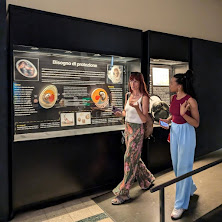
Παρασκευή 7 Νοεμβρίου 2025
Πέμπτη 30 Οκτωβρίου 2025
Σάββατο 10 Αυγούστου 2024
ERASMUS SEMINAR IN ROME ON OUTDOOR EDUCATION,24-28 JUNE 2024
The Member of the Pedagogical Team of the Environmental Education Center of Vamos (Environmental Education Center for Sustainability),Adriana Basiou ,participated in a seminar on Outdoor Education in Rome, Italy, from June 24 to 28, 2024. This mobility took place within of the Erasmus+ KA1 program (Erasmus+ Accreditation), which has been approved by the State Scholarship Foundation (Approval No. 2023-1-EL01-KA121-ADU-000125830) with the co-financing of the European Union.


Infol is a provider of Erasmus courses approved by the European Commission. It organizes courses for teachers and training professionals, internships for vocational schools in Rome and Greece with Erasmus+ funding.
During the seminar:
The participants introduced themselves and their schools and talked about the concept of Outdoor Education from many perspectives (Definition of outdoor education and its benefits, historical perspectives, the role of outdoor education in modern pedagogy, building a foundation for outdoor teaching)
The seminar was then held outdoors in the green park of Villa Borghese, where participants discussed and reflected on curriculum design for outdoor learning and aligning outdoor activities with educational goals by integrating core themes into outdoor lessons. They then split into groups and designed an outdoor lesson plan and a new game.


In addition, a cultural visit was held on the theme of "Water Management", during which participants were guided to historical underground reservoirs and a discussion was held on the ancient compared to the modern use and management of water resources.
The objectives achieved with the seminar are:
-Better and wider understanding of the principles and benefits of outdoor education.
-Improvement in outdoor curriculum design aligned with educational goals.
-Development of additional outdoor teaching skills and environmental awareness.
-Learning how to cultivate a sense of environmental stewardship in students.


Participating in Erasmus+ programs is a unique educational and cultural experience that promotes peaceful coexistence and mutual understanding and helps to improve our educational practice, while opening new horizons.
Κυριακή 21 Ιουλίου 2024
From the classroom to the park: the power of Outdoor Education
 |
Human beings have always been profoundly influenced by nature. From prehistoric times to the present day, being outdoors has played a crucial role in our cognitive, behavioral, and emotional development. Recognizing this, educators are increasingly turning to outdoor education to enhance learning experiences. This innovative approach not only provides high-quality education but also fosters a deep appreciation for the environment, crucial in our era of climate change.
The new edition of the course “Outdoor education: a new way of teaching and learning” took place in Bologna from 30/06/2024 to 06/07/2024. The participants came from all across Europe, with Alexis and Georgios from 10o Gymnasio Iraklioy and Fotis from Environmental Education Centre of Vamos in Greece, Ruth, Esther and Aida from Escola Guillem Fortuny and Montserrat and Patricia from Escola Collserola in Spain, Urska from Osnovna šola Podčetrtek in Slovenia and Ľubica, Martin, Marek and Michal from Evanjelická spojená škola and Martin and Ľuboš and Peter from Stredná odborná škola stavebná, Tulipánová 2 in Slovakia.
Outdoor education extends beyond forests and natural landscapes. Urban environments, with their diverse settings, also offer rich learning opportunities. For this reason the aim of this course was to prove that educations can use non-formal methods like Outdoor Education to teach a great variety of subjects (math, literature, art, music, science etc) both in natural and urban settings. This highlighted the versatility of outdoor education, demonstrating that it can thrive also by taking a short walk around the block of the school.
To prove this point a whole day was dedicated to both settings. The second day of the course was dedicated to practical activities in a local park. Teachers engaged in various educational games, which not only inspired them but also provided practical tools for their own classrooms. These activities were focused mainly on how to foster collaboration and inclusion through experiential learning and non formal methodologies. On the fourth day of the course participants headed to the city centre of Bologna and played an interactive treasure hunt, discovering some hidden gems around town, learning about local history and culture and engaging in missions and challenges!
One of the course's highlights was also the creation of personalized outdoor lessons tailored to each teacher’s specific group of students. After studying the 10 principles of Outdoor Learning developed by Kurt Hans, educators designed detailed outdoor sessions. These sessions were then shared with peers for feedback, ensuring they were well-rounded and effective.
The Bologna course was a testament to the effectiveness of experiential outdoor learning. Participants experienced firsthand the benefits of this teaching approach and acquired the skills needed to implement it in their classrooms. The range of activities explored during the course demonstrated that education can thrive outside traditional classroom settings.
Participants left the course not only with a wealth of new knowledge but also with cherished memories of fun, hands-on activities. They gained practical skills and insights that will transform their teaching practices. The experience underscored the incredible potential of outdoor education to make learning engaging and impactful for students.
Discover more about this course here.









